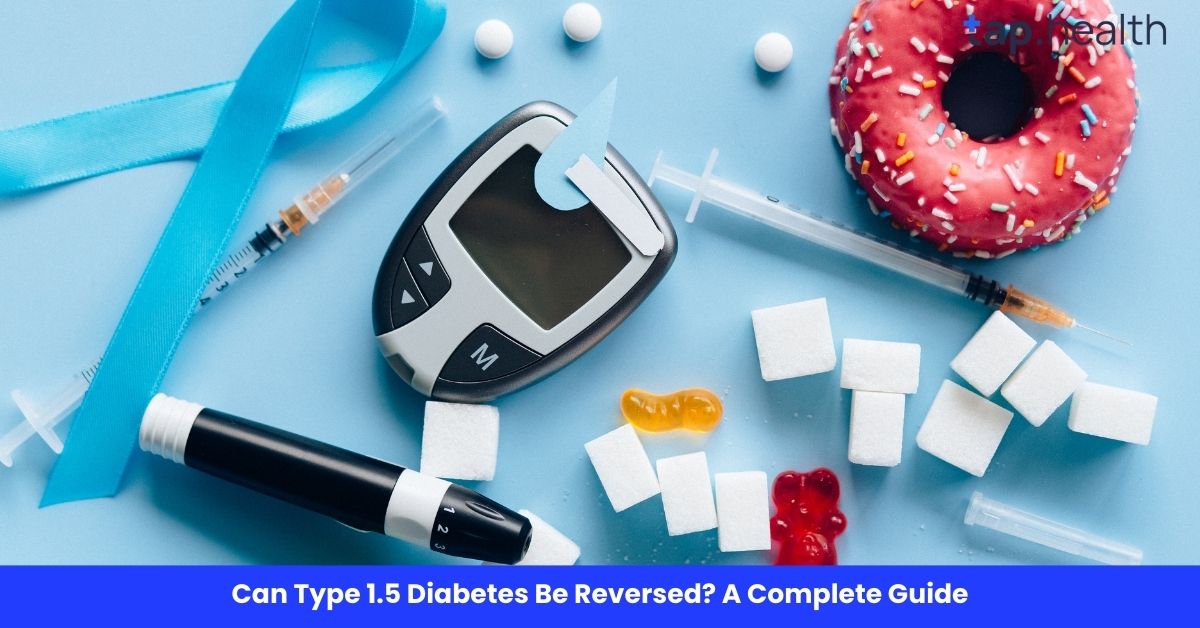Diabetes is a serious medical condition that can affect anyone, and understanding the various types of diabetes is crucial for managing the disease. Type 1.5 diabetes, also known as Latent Autoimmune Diabetes in Adults (LADA), is a lesser-known form of diabetes that is often misunderstood and misdiagnosed. But can Type 1.5 diabetes be reversed? In this article, we will dive deep into this question and explore the key aspects of Type 1.5 diabetes, its symptoms, treatment options, diagnosis, and management. Let’s get started!
What is 1.5 Diabetes?
Type 1.5 diabetes, or LADA, is a hybrid form of diabetes that combines features of both Type 1 and Type 2 diabetes. It is classified as an autoimmune condition, similar to Type 1 diabetes, in which the body’s immune system mistakenly attacks and damages the insulin-producing beta cells in the pancreas. However, unlike Type 1 diabetes, which is often diagnosed in children or young adults, Type 1.5 diabetes tends to develop in adults, usually after the age of 30.
The hallmark of Type 1.5 diabetes is its slow progression. Initially, individuals with LADA may still produce some insulin, and their bodies may be able to handle blood sugar through oral medications or diet. However, over time, the pancreas becomes unable to produce enough insulin to meet the body’s needs, and insulin therapy is typically required. This slow progression is a key difference between Type 1.5 and Type 1 diabetes, where insulin dependency occurs rapidly after diagnosis.
Symptoms of Type 1.5 Diabetes
The symptoms of Type 1.5 diabetes can be similar to those of both Type 1 and Type 2 diabetes. However, the onset is typically gradual, making it harder to detect in the early stages. Some common symptoms include:
- Increased thirst and frequent urination: The body attempts to get rid of excess glucose in the blood by flushing it out through urine, leading to dehydration.
- Unexplained weight loss: This occurs when the body starts breaking down muscle and fat for energy due to insufficient insulin.
- Fatigue and weakness: The lack of insulin prevents the body from using glucose effectively, causing tiredness and reduced energy levels.
- Blurry vision: High blood sugar levels can affect the lens of the eye, leading to blurred vision.
- Slow-healing cuts or wounds: High blood sugar impairs the body’s ability to heal.
- Irritability and mood swings: Fluctuating blood sugar levels can lead to mood disturbances.
Due to the gradual onset of these symptoms, Type 1.5 diabetes is often misdiagnosed as Type 2 diabetes, especially in adults who are diagnosed later in life.
Can Type 1.5 Diabetes Be Reversed?
At present, there is no known cure or way to fully reverse Type 1.5 diabetes. However, its progression can be slowed down with early detection and effective management strategies. People diagnosed with LADA may initially be able to control their blood sugar levels through lifestyle changes, diet, and oral medications, but as the disease progresses, insulin therapy becomes necessary.
While Type 2 diabetes can sometimes be put into remission through significant lifestyle changes (such as weight loss), Type 1.5 diabetes is not reversible in the same way. The autoimmune process that damages the pancreas’ ability to produce insulin is ongoing and irreversible, but that does not mean individuals with LADA cannot lead healthy, fulfilling lives.
With careful monitoring and appropriate treatment, many people with Type 1.5 diabetes can manage the disease effectively for years. Early intervention and consistent care can help prevent complications and improve overall quality of life.
Type 1.5 Diabetes Treatment
The treatment for Type 1.5 diabetes generally involves a combination of medication, diet, exercise, and careful monitoring of blood glucose levels. Below are the most common treatment methods:
1. Insulin Therapy
Since Type 1.5 diabetes is characterized by insulin deficiency, most individuals will eventually need insulin therapy to maintain blood sugar control. Insulin may be introduced gradually as the body’s insulin production declines. The amount and type of insulin needed will vary depending on the individual’s blood sugar levels, lifestyle, and disease progression.
2. Oral Medications
In the early stages of Type 1.5 diabetes, oral medications (like Metformin, sulfonylureas, or GLP-1 agonists) may be prescribed to help regulate blood sugar levels. These medications can enhance insulin sensitivity, reduce insulin resistance, or help the pancreas produce more insulin. However, as the disease progresses, oral medications alone may no longer be effective, and insulin therapy will become necessary.
3. Diet and Lifestyle Changes
A key aspect of managing Type 1.5 diabetes is maintaining a healthy diet and staying physically active. Healthy eating can help prevent blood sugar spikes and improve overall health. A well-balanced diet includes:
- Low-carb, high-fiber foods: Foods like whole grains, vegetables, and legumes can help regulate blood sugar levels.
- Lean proteins and healthy fats: Including foods like fish, nuts, seeds, and olive oil can help maintain steady blood sugar levels.
- Avoiding processed sugars and refined carbohydrates: These foods can cause blood sugar levels to rise rapidly.
Exercise is also essential for managing Type 1.5 diabetes. Regular physical activity helps increase insulin sensitivity and can help maintain a healthy weight.
4. Blood Sugar Monitoring
Continuous blood glucose monitoring is essential for individuals with Type 1.5 diabetes. Regular testing allows you to keep track of your blood sugar levels and adjust your treatment plan as needed. A glucose meter or continuous glucose monitoring system can help keep you informed of fluctuations in blood sugar and prevent complications.
Type 1.5 Diabetes Life Expectancy
The life expectancy of someone with Type 1.5 diabetes can be comparable to that of individuals without diabetes, provided the disease is well-managed. Uncontrolled blood sugar levels over time can lead to serious complications, such as cardiovascular disease, kidney damage, nerve damage, and vision problems, which can shorten life expectancy.
However, with proper management, many people with LADA can live long, healthy lives. Early detection, insulin therapy, regular monitoring, and a healthy lifestyle all contribute to maintaining good health and a normal life expectancy.
Type 1.5 Diabetes vs Type 1
While Type 1 and Type 1.5 diabetes are both autoimmune diseases that result in the destruction of insulin-producing cells in the pancreas, there are several differences between the two:
- Age of onset: Type 1 diabetes is typically diagnosed in childhood or adolescence, while Type 1.5 diabetes usually develops in adults, often in their 30s or 40s.
- Progression: Type 1 diabetes is a rapidly progressing condition where insulin dependency is required shortly after diagnosis. Type 1.5 diabetes, on the other hand, progresses more slowly, and individuals can often manage their blood sugar with oral medications and lifestyle changes for several years.
- Insulin production: In Type 1 diabetes, the pancreas produces little to no insulin, while in Type 1.5 diabetes, some insulin is still produced initially, but the body gradually loses its ability to produce adequate insulin.
| Aspect | Type 1 Diabetes | Type 1.5 Diabetes (LADA) |
|---|---|---|
| Age of Onset | Typically diagnosed in childhood or adolescence | Typically develops in adults, often in their 30s or 40s |
| Progression | Rapid progression, insulin dependency required soon | Progresses slowly, initially manageable with oral meds and lifestyle |
| Insulin Production | Little to no insulin produced | Initially some insulin produced, but gradually decreases |
| Cause | Autoimmune destruction of insulin-producing cells | Autoimmune attack on pancreas, leading to insulin deficiency |
| Insulin Dependency | Requires insulin therapy immediately after diagnosis | Initially can be managed with oral medications and lifestyle changes, but eventually requires insulin |
Type 1.5 Diabetes vs Type 2
Type 1.5 diabetes shares some characteristics with Type 2 diabetes, but they are distinct in several ways:
- Cause: Type 2 diabetes is caused by insulin resistance, where the body’s cells no longer respond effectively to insulin. In contrast, Type 1.5 diabetes results from an autoimmune attack on the pancreas, leading to insulin deficiency.
- Age of onset: Type 2 diabetes is more commonly diagnosed in individuals over the age of 40, while Type 1.5 diabetes typically affects younger adults.
- Treatment: Type 2 diabetes is often treated with oral medications, lifestyle changes, and sometimes insulin. Type 1.5 diabetes, however, generally requires insulin therapy as the disease progresses.
| Aspect | Type 1.5 Diabetes (LADA) | Type 2 Diabetes |
|---|
| Cause | Autoimmune attack on the pancreas, leading to insulin deficiency | Insulin resistance, where the body’s cells no longer respond effectively to insulin |
| Age of Onset | Typically develops in adults, often in their 30s or 40s | More commonly diagnosed in individuals over 40 |
| Progression | Progresses slowly, initially manageable with oral medications and lifestyle changes | Slow progression, can often be managed with oral medications, lifestyle changes, and sometimes insulin |
| Insulin Production | Initially some insulin produced, but gradually decreases | Insulin resistance, pancreas may still produce insulin, but it is not used effectively |
| Treatment | Initially managed with oral medications and lifestyle, but eventually requires insulin | Often managed with oral medications, lifestyle changes, and sometimes insulin |
How is Type 1.5 Diabetes Diagnosed?
The diagnosis of Type 1.5 diabetes is challenging due to its similarities to both Type 1 and Type 2 diabetes. To confirm the diagnosis, doctors typically use a combination of the following tests:
- Blood glucose tests: The A1C test and fasting blood sugar test measure average blood glucose levels over time to determine if a person has diabetes.
- Autoantibody testing: This test checks for the presence of antibodies that target insulin-producing cells in the pancreas. The presence of these antibodies suggests an autoimmune cause of diabetes.
- C-peptide test: This test measures insulin production. Low C-peptide levels indicate that the pancreas is producing insufficient insulin.
Type 1.5 Diabetes Diet Plan
A healthy diet plays a crucial role in managing Type 1.5 diabetes. Here’s a brief guide to what you should include in your diet:
- Carbohydrates: Focus on complex carbohydrates, such as whole grains, vegetables, and legumes, to prevent blood sugar spikes.
- Proteins: Choose lean proteins like chicken, fish, tofu, and legumes to help regulate blood sugar levels.
- Fats: Incorporate healthy fats like avocados, olive oil, and nuts into your diet to support overall health.
- Fiber: High-fiber foods, such as fruits, vegetables, and whole grains, help slow the absorption of glucose and maintain blood sugar control.
A registered dietitian can help you create a personalized diet plan based on your specific needs and preferences.
Is Type 1.5 Diabetes Rare?
While Type 1.5 diabetes is not as well-known as Type 1 or Type 2 diabetes, it is not extremely rare. It is estimated that 5-10% of people with diabetes may have Type 1.5 diabetes. However, due to its slow progression and similarities to Type 2 diabetes, it is often misdiagnosed.
Also read this : Is green pea good for diabetic patients?
FAQ on Can Type 1.5 Diabetes Be Reversed?
Can you get rid of Type 1.5 diabetes?
Currently, Type 1.5 diabetes cannot be cured or reversed, but with proper management, you can live a long, healthy life.
What should a Type 1.5 diabetic eat?
A balanced diet rich in low-carb, high-fiber foods, lean proteins, and healthy fats is recommended for managing blood sugar levels.
Is Type 1.5 diabetes genetic?
There may be a genetic component to Type 1.5 diabetes, but lifestyle factors like diet and exercise play a major role.
Is diabetes 100% genetic?
Diabetes has both genetic and environmental components. While family history can increase your risk, lifestyle factors like diet and exercise are also significant.
Can LADA be controlled with diet?
Diet can help manage LADA, but insulin therapy is usually required as the disease progresses.
Is diabetes transferable from husband to wife?
Diabetes is not contagious, but both spouses may share similar risk factors or lifestyle habits that increase the chance of developing diabetes.
Which type of diabetes is reversible?
Type 2 diabetes can sometimes be put into remission with significant lifestyle changes.
How to avoid diabetes if it runs in your family?
Maintaining a healthy weight, staying active, and eating a balanced diet can help reduce the risk of developing diabetes, especially if it runs in your family.



